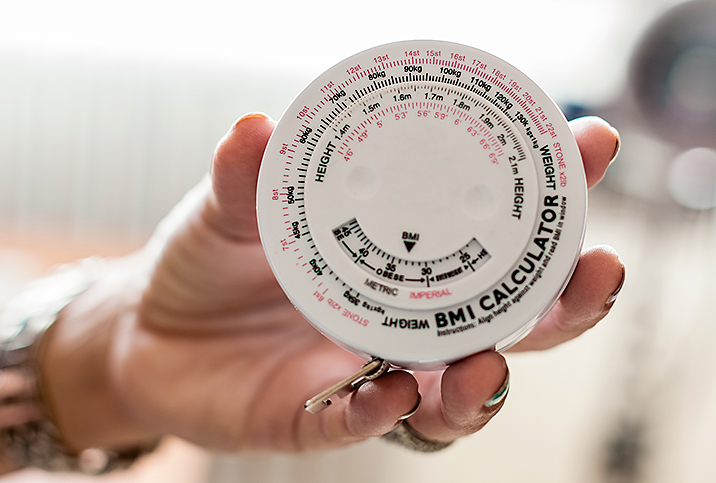Is the Body Mass Index BS?

The body mass index (BMI) is a widely used formula that divides a person's body weight by their height to determine whether they are "underweight," "normal," "overweight" or "obese."
The 190-year-old formula is as ubiquitous as it is disputed. At best, it's defective; at worst, it's possibly harmful.
The origins of the BMI
Lambert Adolphe Jacques Quetelet invented the original formula, which he coined the Quetelet Index, in 1832. Notably, he never intended for it to become a tool for measuring an individual's body fat, composition or health, but instead as a method for measuring populations.
"The BMI was created by Quetelet, a mathematician, astrologer and statistician with no background in health care," said Lauren Sharpe, a registered dietitian based in Philadelphia. "Quetelet was interested in studying human traits and figuring out what the 'average man' looked like. It was created to categorize people and look at the distribution of the human population."
By the early 1900s, Quetelet's Index was being used as scientific justification for eugenics, the theory of forced sterilization based on the bizarre, erroneous and unethical notion of "racial improvement." However, legitimate medical and science practitioners didn't use weight as a key determiner of health until years later.
In 1943, the Metropolitan Life Insurance Company (MetLife) designed an actuarial table—again based on data from a predominantly white, middle- and upper-class population—to classify people into various sizes: "small," "medium" or "large." The goal was to estimate individuals' life expectancy based on weight and offer corresponding life insurance coverage rates.
Keys and fellow researchers openly warned that the BMI was imperfect, admitting it only accurately diagnosed obesity about 50 percent of the time.
Despite the table's multiple flaws—including self-reported and often inaccurate data and the fact that life insurance companies were not staffed by physicians but sales agents and actuaries—competitors quickly followed suit. Not long after, physicians did, too.
In 1972, researcher Ancel Keys, Ph.D., coined the term "body mass index" in his paper "Indices of Relative Weight and Obesity," published in the Journal of Chronic Diseases. Again, Keys' study involved predominantly white men, using the index previously known as the Quetelet Index to analyze subjects' adiposity-body density and subcutaneous fat thickness.
Keys and fellow researchers openly warned that the BMI was imperfect, admitting it only accurately diagnosed obesity about 50 percent of the time, compared to less-effective methods such as water displacement and skin calipers. According to a 2011 report in the Journal of Obstetrics and Gynecology, the figure has remained consistent, indicating the body mass index was less than 50 percent accurate in detecting "obesity" in Black, white and Hispanic women.
Nonetheless, in 1985, the National Institutes of Health started using the BMI to define obesity, cementing it as a standard for providers and policymakers throughout the U.S. In 1998, the NIH revised their definitions of "overweight" and "obese," again significantly lowering the threshold and essentially rendering millions more Americans "fat" overnight.
Today, more than 200 countries use the body mass index as a standard gauge of health.
How inaccurate is it?
Despite its prevalence and authoritative backing, there is ample evidence the BMI is ineffective. Even the CDC, which has stated the correlation between the body mass index and body fat, or composition, is "fairly strong," advised healthcare providers not to use it as a diagnostic tool because it does not measure body fat directly.
The formula fails to consider many other factors that can affect a person's health, several of which are far more impactful than body weight. Sharpe said some of these factors include muscle mass, metabolic health, mental health, stress, physical activity levels, smoking, social and environmental influences, and weight stigma experiences.
One study published in the International Journal of Obesity examined more than 40,000 people across all population groups and found that more than 30 percent of people with "normal" BMIs are cardio-metabolically unhealthy. Furthermore, nearly 50 percent of those classified as "overweight" and 29 percent of those in the "obese" category were deemed healthy based on the same metabolic lab tests and blood pressure readings. The authors of the study concluded up to 74 million individuals considered "unhealthy" based on their body mass index are actually healthy.
Another study published in PLOS One found nearly half of women and 25 percent of men classified as obese based on body fat percentage were not considered obese based on their BMI.
Professional athletes are one conspicuous example of the body mass index's shortcomings. More than half of professional American football players, for example, have a BMI higher than 30. This qualifies them as "obese" without accounting for their unusually high muscle mass.
The formula fails to consider many other factors that can affect a person's health, several of which are far more impactful than body weight.
"When you step on the scale, and it says 150 pounds, your BMI calculation has no way of knowing how that weight is distributed throughout your body," said Mahmud Kara, M.D., an Ohio-based functional medicine practitioner. "Those with higher muscle mass, especially lean muscle, which is typically seen in athletes, will have higher body weights, which increases their BMI and might land them in the 'obese' category. However, when we look at the negative health outcomes associated with obesity, such as the increased risk for heart disease, these individuals do not fit the bill."
In fact, Kara added, more lean muscle mass actually correlates to a lower risk of heart disease.
"Beyond muscle mass, the BMI does not consider fat distribution or bone mass, either," said Emma Thornton, a registered nutritionist and health advisor at A.Vogel.
Research indicates people with high amounts of upper body and visceral fat are more likely to experience metabolic complications than those who store fat in the lower body and subcutaneous areas, and bone can account for about 15 percent of a person's weight.
"With the advances in modern medicine, we are learning more about how body fat is distributed and what this can indicate about our overall health state," Thornton said. "Bone mass is another variable which [the] BMI doesn't take into account, and which could majorly skew the results."
How the BMI affects health care
Beyond its inefficacy, the body mass index can be problematic for large swaths of the population, including Black and Indigenous people of color (BIPOC), people who are "overweight" or "obese," and individuals with eating disorders. Essentially, it benefits few people outside of those it was initially intended to study—that is, white men.
In developing his formula, Quetelet used data only from white Western European men. At the time, of course, this wasn't unusual. White bodies were widely used as determiners in most health research and policymaking endeavors well into the 20th century. Still today, women and BIPOC are underrepresented in medical research, an issue that continues to affect care access and quality.
The use of the bare-bones BMI formula to assess people's risk of certain ailments, like diabetes and heart disease, is of particular disservice to BIPOC communities.
For instance, the high rate of chronic disease among Black Americans has been attributed to obesity. However, obesity rates among Black Americans are overestimated because of the BMI, suggesting weight may not be the primary cause of illness. While risk factors along ethnic lines are complex, research indicates structural racism contributes to various health disparities affecting multiple groups.
People of Asian descent could also be subject to the body mass index's shortcomings, which recently prompted the World Health Organization (WHO) to adjust BMI cut-off points for this demographic.
"Some research suggests that Asian Americans hold higher visceral fat levels around their major organs, which poses a serious risk for their health even if they are not considered 'overweight' by the BMI standards," Kara said. "In this case, using the traditional BMI scale that has no way of knowing about this fat distribution in the body might lead to dangerous oversight regarding serious health conditions if that's the only diagnostic tool used to look at one's health."
Aside from racial considerations, body mass index can perpetuate weight bias and misconceptions. Again, the consequences of this range from mental health effects to discrimination and lack of access to health care.
"Many people with higher weight BMIs can be healthy, so the BMI perpetuates weight bias or the idea that someone in a larger body is automatically unhealthy," Sharpe said. "The same goes for eating disorders. A common misconception is that you must be underweight [<18.5 on BMI scale] to have an eating disorder, which leads to many misdiagnoses and leaves many struggling to fend for themselves in terms of care. According to the National Association of Anorexia Nervosa and Associated Disorders, less than 6 percent of people with eating disorders are actually medically diagnosed as 'underweight.'
"In addition, a perfectly healthy person—by means of lab work, and other measures of health—who is in the 'overweight' or 'obese' category of the BMI might be advised to lose weight," Sharpe continued. "This has the potential to result in restrictive eating behaviors and excessive exercise/unhealthy behaviors in general, leading to a decline in health. Moreover, someone who is in a bigger body might experience weight stigma or feeling shame for their body size in a doctor's office resulting in them avoiding the doctor, further declining their health."
"Our health is complex—there are a variety of systems in our body that work together to achieve optimal wellness, and there are a variety of factors, internally and externally, that can impact our overall health in a positive and negative way," Kara said. "For individuals, specifically those with eating disorders or other challenges, the BMI can cause distorted, and inaccurate, views about one's health or body image."
Alternatives to the BMI
Many experts stand by the body mass index because it's both inexpensive and simple, which can be hard to come by.
"The only two data points needed for the formula are height and weight," Kara said. "This cuts down on the need for expensive equipment, extensive health consultations and other complex diagnostic tools. It also serves as an accessible and simple test for people to perform at home without traditional medical intervention."
However, there are several alternatives, including DEXA (dual-energy x-ray absorptiometry), which Kara explained uses electromagnetic currents to measure body composition. This method, however, isn't cheap and is inaccessible for many healthcare providers.
There's also the Relative Fat Mass (RFM) formula.
"The RFM formula takes into consideration your gender, height and waist circumference to determine your obesity level as well as other risk factors," Kara explained. "Unlike the BMI, this method takes into consideration important factors like gender, as well as the distribution that was mentioned earlier by focusing on the waist circumference instead of general weight in pounds. Skin calipers, which can measure the thickness of subcutaneous fat, are another option."
'I don't think we need to replace BMI at all. I think we need to completely eradicate it and focus on healthful behaviors independent of body size.'
But Sharpe and others argue it isn't the mechanism but the mindset that needs to change. More than being inaccurate, Sharpe said, in her opinion, using body size as a sole determiner of health is "unethical."
"I don't think we need to replace BMI at all. I think we need to completely eradicate it and focus on healthful behaviors independent of body size. Our health is so much more than the diet we eat and how much we exercise," she said, adding that while individual behaviors are important, they are far from the only factor influencing overall health.
"Body fat is by no means a sole predictor of health," Thornton agreed, noting that genetic, physiological and psychological variables are also "hugely important, especially when considered in combination with one another."
"I always say that it is not about the number on the scale but rather how you feel," Kara said. "If you are constantly tired, sick, foggy, achy or if you are having poor readings when it comes to crucial numbers—cholesterol, blood sugar or blood pressure—then these should serve as important indicators that something is going on with your health that needs to be addressed regardless of your BMI.
"A BMI will not help you take a whole-body approach to health and wellness. It will only just scratch the surface," he continued. "When looking at our health, it is always best to take a holistic approach and consider all of the variables that impact how we feel and how we live, especially when it comes to disease and prevention."




















